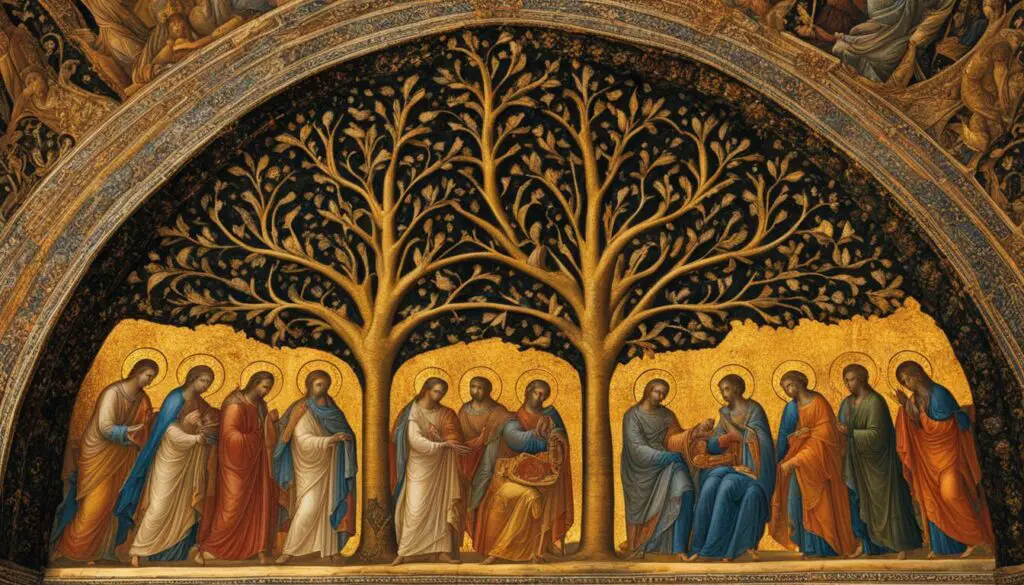The Ante-Nicene Period holds a significant place in early Christian theology and church history. This period, which predates the Council of Nicaea in 325 AD, played a crucial role in shaping the development of Christianity and its theological foundations.
During the Ante-Nicene Period, influential church fathers wrote extensively on various theological topics, leaving a lasting impact on the early Christian Church. Their writings provide valuable insights into the beliefs and practices of early Christianity, offering a window into the formative years of the faith.
Key Takeaways:
- The Ante-Nicene Period refers to the time before the Council of Nicaea in 325 AD.
- Church fathers played a crucial role in shaping early Christian theology.
- The Ante-Nicene Period influenced the development of key Christian doctrines.
- Early Christian writings provide valuable insights into the beliefs and practices of the early Church.
- The Ante-Nicene Period continues to be studied for its relevance to modern Christianity.
Understanding the Church Fathers of the Ante-Nicene Period
The Ante-Nicene Period, a significant era in historical Christianity, was marked by the influential teachings and writings of the church fathers. These individuals played a vital role in the development of early Christianity and the formulation of its doctrines. Understanding their contributions is crucial for comprehending the evolution of the Christian faith.
The church fathers, such as Justin Martyr, Irenaeus, and Clement of Alexandria, made notable contributions to early Christian theology. Their writings covered a wide range of topics, including the nature of God, the divinity of Jesus Christ, and the role of the Holy Spirit. Through their works, they sought to articulate and defend orthodox Christian beliefs against various heretical teachings.
The writings of the church fathers provide valuable insights into the beliefs and practices of early Christianity. These theological giants engaged in debates and discussions with pagans, Jews, and heretics, using their knowledge to defend and promote the Christian faith. Their teachings continue to impact modern Christianity, as their doctrines form the foundation of many Christian denominations today.
“The church fathers of the Ante-Nicene Period not only shaped the beliefs of their time but also laid the groundwork for the development of Christianity for centuries to come. Their writings serve as a rich resource for understanding historical Christianity and the challenges faced by early Christians.” – The Ante-Nicene Theologian
To fully comprehend the development of Christianity, it is necessary to delve into the works of the church fathers and grasp their theological insights. Through examination of their writings, researchers and theologians gain a deeper understanding of how historical Christianity developed and how it has influenced the modern Church. The church fathers of the Ante-Nicene Period played a crucial role in shaping the foundations of the Christian faith, leaving a lasting legacy that continues to impact believers today.
| Church Father | Major Works | Contributions |
|---|---|---|
| Justin Martyr | “The First Apology,” “The Dialogue with Trypho” | Defended Christianity against pagan accusations, blended philosophy with scriptural arguments |
| Irenaeus | “Against Heresies” | Combatting heresy, emphasized the importance of apostolic tradition and unity of the Christian faith |
| Clement of Alexandria | “Exhortation to the Greeks” | Stressed the importance of Greek philosophy in Christianity and the pursuit of spiritual knowledge |
The Impact of the Ante-Nicene Period on Early Christianity
The Ante-Nicene Period, spanning the time before the Council of Nicaea in 325 AD, played a significant role in shaping early Christianity. During this period, the church fathers engaged in theological discourse and defended the faith against various challenges. Their writings and teachings not only influenced the early Christian Church but continue to impact modern Christianity as well.
Christian apologetics emerged as a crucial aspect of the Ante-Nicene Period. The church fathers engaged in debates and discussions with pagans, Jews, and heretics, providing intellectual arguments for the truth of Christianity. Their writings were instrumental in defending the faith against accusations and establishing the foundations of Christian apologetics.
“We do not speak great things but we live them.”
Furthermore, the church fathers addressed important theological topics that shaped the development of early Christianity. They delved into the nature of God, the divinity of Jesus Christ, the role of the Holy Spirit, and the doctrine of salvation. Through their writings, the church fathers provided a theological foundation that still resonates within Christian communities today, influencing beliefs and practices.

| Impact of Ante-Nicene Period | Aspects |
|---|---|
| Development of Christian Apologetics | The church fathers’ engagement in debates and discussions contributed to the establishment of Christian apologetics. |
| Influence on Theological Topics | Writings addressing the nature of God, divinity of Jesus Christ, Holy Spirit, and salvation shaped early Christian theology. |
| Continued Impact on Modern Christianity | The theological foundations provided by the church fathers are still upheld in beliefs and practices within Christianity today. |
The Writings of Justin Martyr in the Ante-Nicene Period
Justin Martyr was a prominent figure in the Ante-Nicene Period, known for his significant contributions to early Christian writings. His works, such as “The First Apology” and “The Dialogue with Trypho,” provide valuable insights into the early Christian theology and the struggles faced by the early Church. Justin Martyr’s writings offer a unique perspective on the defense of Christianity against pagan accusations and his arguments for the truth of the faith.
In “The First Apology,” Justin Martyr defends Christianity against the accusations of atheism and immorality, presenting a systematic explanation of Christian beliefs and practices. He argues that Christianity is the true philosophy and the only path to salvation. Justin Martyr also engages in a dialogue with Trypho, a Jewish philosopher, in “The Dialogue with Trypho,” where he presents a defense of the Christian faith by interpreting Old Testament prophecies and demonstrating the superiority of Christianity over Judaism.
“We do not consume the eucharistic bread and wine as common food and drink, but as Jesus Christ our Savior was made flesh through the word of God and was crucified for our sins, so too, as we have been taught, the food which has been made into the Eucharist by the Eucharistic prayer set down by him, and by the change of which our blood and flesh is nourished, is both the flesh and the blood of that incarnated Jesus.”
Justin Martyr’s writings not only provide theological insights but also reveal the struggles and challenges faced by early Christians in defending their faith. His works continue to be studied and revered today, offering valuable perspectives on the development of Christianity in the Ante-Nicene Period.
| Works of Justin Martyr | Description |
|---|---|
| “The First Apology” | A defense of Christianity against accusations of atheism and immorality. |
| “The Dialogue with Trypho” | A dialogue between Justin Martyr and Trypho, a Jewish philosopher, discussing the superiority of Christianity over Judaism. |
Irenaeus and the Fight Against Heresy in the Ante-Nicene Period
Irenaeus, one of the prominent church fathers of the Ante-Nicene Period, played a pivotal role in defending orthodox Christian doctrine and combating heresy. His influential work, “Against Heresies,” stands as a comprehensive refutation of various heretical teachings, particularly Gnosticism. In this monumental treatise, Irenaeus meticulously exposes the errors and inconsistencies of heretical beliefs, while affirming the unity and continuity of the Christian faith.
Irenaeus emphasized the importance of apostolic tradition as a reliable source of true Christian doctrine. He argued that the teachings of the apostles, passed down through the generations, provide a solid foundation for combating heresy and preserving the integrity of the faith. His writings serve as a valuable resource for understanding the theological debates and challenges that unfolded during the Ante-Nicene Period.
“Error, indeed, is never set forth in its naked deformity, lest, being thus exposed, it should at once be detected. But it is craftily decked out in an attractive dress, so as, by its outward form, to make it appear to the inexperienced (ridiculous as the expression may seem) more true than the truth itself,”
— Irenaeus, Against Heresies
Irenaeus’ work not only defends orthodox Christian doctrine but also provides valuable insights into the beliefs and practices of the early Church. His emphasis on the unity of the faith and the importance of apostolic tradition continues to resonate in modern Christianity. By studying Irenaeus’ writings, we can better understand the challenges faced by the early Church and gain a deeper appreciation for the enduring significance of the Ante-Nicene Period.
Table: Comparison of Orthodox Christianity and Gnosticism
| Orthodox Christianity | Gnosticism |
|---|---|
| Belief in the Trinity | Rejects the Trinity and emphasizes a dualistic view of divinity |
| Emphasis on the incarnation of Jesus Christ | Views Jesus as a purely spiritual being and denies his physical incarnation |
| Authority of Scripture | Downplays the importance of Scripture and focuses on mystical revelations |
| Salvation through faith and grace | Salvation achieved through secret knowledge (gnosis) |
| Importance of the Church as a community | Individualistic spirituality, often rejecting institutionalized religion |

By comparing orthodox Christianity to Gnosticism, we can see the stark contrasts between these two belief systems. While orthodox Christianity emphasizes the Trinitarian nature of God, the incarnation of Jesus Christ, the authority of Scripture, and salvation through faith and grace, Gnosticism rejects these tenets in favor of a dualistic and mystical perspective. Irenaeus’ writings and arguments serve as a powerful defense of orthodox Christianity against the allure of Gnostic teachings.
In conclusion, Irenaeus played a crucial role in the fight against heresy during the Ante-Nicene Period. His writings continue to enlighten and inspire believers today, reminding us of the importance of defending orthodox Christian doctrine and preserving the unity of the faith.
The Importance of Early Christian Writings in the Ante-Nicene Period
The Ante-Nicene Period is of significant importance in the development of Christianity, and early Christian writings from this period play a crucial role in understanding the foundations of the faith. These writings provide valuable insights into the beliefs, practices, and struggles faced by the early Church, contributing to the growth and development of Christian theology.
During the Ante-Nicene Period, numerous church fathers, such as Clement of Alexandria and Tertullian, wrote extensively on various theological topics, including ethics, salvation, the nature of God, and the importance of Scripture. Their writings offer a glimpse into the vibrant intellectual and theological debates that shaped early Christianity.
Furthermore, the early Christian writings from this period also helped to establish important doctrines and beliefs that continue to influence Christianity today. These include the belief in the Trinity, the divinity of Jesus Christ, the atonement, the authority of Scripture, and the significance of the sacraments.
“The early Christian writings from the Ante-Nicene Period serve as valuable resources for theologians and scholars, providing us with a deeper understanding of the historical and theological roots of Christianity. They offer a window into the diverse perspectives and debates within early Christianity and highlight the enduring relevance of these discussions in our modern context.”
In studying these early Christian writings, we gain a greater appreciation for the development of Christian thought and the challenges faced by the early Church. By delving into the writings of the church fathers and the various theological schools of thought that emerged during this period, we can better grasp the rich tapestry of early Christianity and its continued impact on the development of the faith.

| Church Father | Notable Works |
|---|---|
| Justin Martyr | The First Apology, The Dialogue with Trypho |
| Irenaeus | Against Heresies |
| Clement of Alexandria | Exhortation to the Heathen, Stromateis |
| Tertullian | Apology, Against Praxeas |
The early Christian writings from the Ante-Nicene Period continue to shape our understanding of Christianity’s early history, providing a solid foundation for further theological exploration and reflection. They remind us of the richness and diversity of the Christian tradition, and their insights remain relevant for believers and scholars alike.
The Spread of Christianity in the Ante-Nicene Period
The Ante-Nicene Period was a time of significant growth and expansion for Christianity, despite facing persecution from the Roman Empire. The early Christians were passionate about sharing their faith and spreading the message of Jesus Christ. Through their missionary efforts, the teachings of the church fathers, and the establishment of Christian communities, Christianity began to flourish and extend its reach beyond the boundaries of the Roman Empire.
The spread of Christianity in the Ante-Nicene Period was facilitated by the dedication and commitment of the early Christians to share the good news. They were willing to endure persecution, even death, for their beliefs. These brave individuals traveled far and wide to proclaim the message of salvation, often venturing into new territories and encountering different cultures and languages.
The writings of the church fathers also played a crucial role in the spread of Christianity. Their theological writings not only provided guidance and instruction for the early Christian communities but also served as a defense against false teachings and heresies. These writings were circulated and translated, reaching a wider audience and influencing the growth and development of Christianity.
Table: Growth of Christianity in the Ante-Nicene Period
| Factors | Impact |
|---|---|
| Missionary efforts | Christianity spread to new territories through the dedicated efforts of missionaries who were passionate about sharing the Gospel. |
| Writings of the church fathers | The theological insights and teachings of the church fathers influenced the beliefs and practices of early Christian communities. |
| Establishment of Christian communities | Christian communities provided support and a sense of belonging for early Christians, furthering the growth and spread of the faith. |
The spread of Christianity in the Ante-Nicene Period laid the foundation for the future growth and development of the faith. The early Christians’ commitment to sharing their beliefs and the teachings of the church fathers continue to inspire and influence Christians today. The Ante-Nicene Period serves as a testament to the resilience and determination of the early Church, and its impact can still be seen in the widespread presence of Christianity in the world today.

Key Doctrines and Beliefs of the Ante-Nicene Period
The Ante-Nicene Period was a critical time in the development of Christian theology. During this period, many key doctrines and beliefs were formulated that continue to shape Christianity today. These doctrines were a response to various challenges and controversies faced by the early Church, and they lay the foundation for the Christian faith as we know it.
One of the central doctrines of the Ante-Nicene Period was the belief in the Trinity. The church fathers grappled with the nature of God and the relationship between the Father, Son, and Holy Spirit. They affirmed that these three persons are distinct yet co-eternal and co-equal, forming one Godhead. This understanding of the Trinity remains a fundamental tenet of Christian theology.
Another significant belief that emerged during this period was the divinity of Jesus Christ. The church fathers defended the belief that Jesus was not merely a human being but also fully divine. They contended that Jesus, as the Son of God, shared in the nature and substance of God. This belief in the divinity of Christ laid the groundwork for later debates and formulations on the nature of the Incarnation and the hypostatic union.
“In Christ the Divine and human natures are united in one person, without confusion, change, division, or separation.”
– Athanasian Creed
The Ante-Nicene Period also saw the development of key doctrines related to salvation and the authority of Scripture. The church fathers articulated the belief in the atoning work of Christ and the necessity of faith in Him for salvation. They also emphasized the authority of the Scriptures as the inspired Word of God, providing the foundation for Christian doctrine and practice.
| Key Doctrines | Beliefs |
|---|---|
| The Trinity | The Father, Son, and Holy Spirit are one God in three persons. |
| Divinity of Jesus Christ | Jesus is fully divine, sharing in the nature and substance of God. |
| Salvation | Salvation is through faith in the atoning work of Christ. |
| Authority of Scripture | The Scriptures are the inspired Word of God, guiding Christian doctrine and practice. |
The key doctrines and beliefs of the Ante-Nicene Period continue to shape Christianity today. They provide a theological framework for understanding the nature of God, the person of Jesus Christ, and the means of salvation. The writings of the church fathers during this period serve as valuable resources for studying and deepening our understanding of these doctrines.

The Legacy of the Ante-Nicene Period in Modern Christianity
The Ante-Nicene Period, with its rich theological insights and writings by the church fathers, has left a lasting legacy in modern Christianity. The teachings and doctrines developed during this period continue to shape the beliefs and practices of Christians around the world. The theological foundation laid by the church fathers provides a historical and theological perspective that informs contemporary conversations within Christianity.
One of the key legacies of the Ante-Nicene Period is the emphasis on the authority of Scripture. The writings of the church fathers defended the divine inspiration and reliability of the Bible, establishing it as the foundational text for Christian doctrine and practice. This emphasis on Scripture continues to be upheld by many Christian denominations today, shaping their understanding of God’s revelation to humanity.
In addition, the Ante-Nicene Period contributed to the development of core Christian doctrines that remain central to modern Christianity. The belief in the Trinity, the divinity of Jesus Christ, the atonement, and the importance of the sacraments were all articulated and defended during this period. These doctrines continue to be upheld by Christians worldwide, providing a framework for understanding God’s nature, salvation, and the role of the Church.
The legacy of the Ante-Nicene Period is also seen in the continued study and reverence for the writings of the church fathers. The theological insights and teachings of figures such as Justin Martyr, Irenaeus, and Clement of Alexandria are still considered valuable resources for theologians and scholars today. Their writings provide deep theological reflections on the nature of God, the role of the Church, and the significance of Jesus Christ.
| Legacy of the Ante-Nicene Period in Modern Christianity |
|---|
| Authority of Scripture |
| Core Christian Doctrines |
| Reverence for the Writings of the Church Fathers |
“The Ante-Nicene Period has left an indelible mark on modern Christianity. Its legacy can be seen in the continued emphasis on the authority of Scripture, the core doctrines that define the faith, and the ongoing study and reverence for the writings of the church fathers.” – The Ante-Nicene Legacy
The Continued Influence of the Ante-Nicene Period
The continued influence of the Ante-Nicene Period extends beyond theological debates and scholarly discussions. Its teachings and doctrines form the bedrock of Christian faith, providing a historical and theological framework that guides believers in their spiritual journey. The writings of the church fathers serve as a source of inspiration and instruction, offering insights into the early Church’s struggles and triumphs.
Moreover, the legacy of the Ante-Nicene Period calls Christians to engage with the challenges of their time, just as the church fathers did in theirs. The writings of figures like Justin Martyr and Irenaeus remind believers to earnestly contend for the faith and defend it against heretical teachings. By studying the Ante-Nicene Period, Christians can gain a deeper appreciation for the historical roots of their faith and be better equipped to navigate contemporary theological questions.
- Continued influence on Christian faith and theology
- Inspiration and instruction from the writings of the church fathers
- Engagement with contemporary challenges rooted in the Ante-Nicene Period
Modern Relevance of the Ante-Nicene Period
The Ante-Nicene Period continues to hold modern relevance by providing valuable historical and theological insights into the development of Christianity. Studying the writings and teachings of the church fathers during this period enables us to gain a deeper understanding of the early Church and the challenges it faced. The debates and discussions around key theological issues, such as the nature of God, the divinity of Jesus Christ, and the authority of Scripture, can inform contemporary conversations within Christianity and contribute to ongoing theological reflection.
Furthermore, the teachings and doctrines established in the Ante-Nicene Period continue to shape Christianity today. The belief in the Trinity, the divinity of Jesus Christ, and the importance of the sacraments, among other key doctrines, find their roots in this period. By understanding the historical context and theological foundation of these beliefs, individuals and communities can engage with their faith more deeply and with a greater appreciation for the rich heritage of Christianity.
In addition, the Ante-Nicene Period offers valuable insights into the early spread and growth of Christianity. Missionary efforts, the establishment of Christian communities, and the writings of the church fathers played pivotal roles in the expansion of the faith during this time. By studying the strategies and challenges faced by early Christians, we can gain inspiration and guidance for contemporary efforts in sharing and living out the Christian faith.
The Significance of Early Christian Writings
One of the key aspects of the Ante-Nicene Period is the abundance of early Christian writings. These writings cover a wide range of topics, including ethics, salvation, the nature of God, and the importance of Scripture. They provide valuable insights into the beliefs and practices of early Christians and contribute to the ongoing development of Christian theology and doctrine.
| Church Father | Main Writings | Key Contributions |
|---|---|---|
| Justin Martyr | “The First Apology” “The Dialogue with Trypho” |
Defended the faith against pagan accusations and argued for the truth of Christianity based on both philosophical and scriptural grounds. |
| Irenaeus | “Against Heresies” | Comprehensively refuted various heretical teachings and emphasized the unity and continuity of the Christian faith. |
| Clement of Alexandria | “Exhortation to the Greeks” “The Stromata” |
Explored the relationship between Greek philosophy and Christian theology, emphasizing the importance of both knowledge and faith. |
These writings, coupled with the teachings of other church fathers, continue to be studied and revered by theologians and scholars. By delving into these texts, we can gain a deeper understanding of the historical and theological foundations of Christianity and apply their insights to contemporary issues and challenges.
The Ante-Nicene Period in the United States
The Ante-Nicene Period, although primarily associated with early Christian history in the Roman Empire, also had a significant impact on the development of Christianity in the United States. As Christianity spread to the New World, the theological insights and writings of the church fathers from the Ante-Nicene Period found resonance among the early American Christians. These writings provided a solid foundation for the theological teachings and practices of the early Christian communities in the United States.
The Ante-Nicene Period influenced various aspects of early Christianity in the United States, including the establishment of denominations, the formation of theological schools, and the development of Christian literature. The teachings of the church fathers, such as Justin Martyr and Irenaeus, played a vital role in shaping the early American understanding of Christian doctrine and practice.
In addition to their theological impact, the writings of the church fathers from the Ante-Nicene Period also inspired early American Christians to engage in apologetics and defend their faith. These early American apologists drew upon the works of the church fathers to articulate and defend their beliefs in the face of challenges and opposition.
“The writings of the church fathers from the Ante-Nicene Period provided a rich theological heritage for early American Christians, shaping their beliefs, practices, and even their apologetic efforts.” – Early American Theologian
The Legacy of the Ante-Nicene Period in American Christianity
The legacy of the Ante-Nicene Period continues to be felt in American Christianity today. The early American Christians who embraced the teachings of the church fathers helped establish a theological foundation that has endured through the centuries. The influence of the Ante-Nicene Period can be seen in the diversity of Christian traditions and denominations that exist in the United States.
Furthermore, the study of the Ante-Nicene Period remains an important area of theological exploration and academic research in American seminaries and religious institutions. Scholars and theologians continue to delve into the writings of the church fathers, drawing insights from their theological perspectives and applying them to contemporary issues and discussions.
In conclusion, the Ante-Nicene Period left an indelible mark on the development of Christianity in the United States. The writings and teachings of the church fathers from this period not only influenced early American Christian thought but also continue to inspire and inform modern American Christianity.
Conclusion
The Ante-Nicene Period holds great significance in the history of early Christian theology and church history. During this crucial time, the writings and teachings of the church fathers laid the foundation for the beliefs and practices of the early Christian Church. Their insights continue to shape Christianity today, making the study of this period essential for theologians and scholars.
Through their extensive writings, the church fathers addressed various theological topics, such as the nature of God, the divinity of Jesus Christ, and the doctrine of salvation. Their engagement in debates and discussions with pagans, Jews, and heretics helped defend the Christian faith and establish the foundations of Christian apologetics.
The legacy of the Ante-Nicene Period can be seen in modern Christianity. The theological insights and writings of the church fathers are still studied and revered by theologians and scholars. The foundational doctrines and beliefs articulated during this period continue to be upheld by many Christian denominations, shaping the theological landscape of today.
In conclusion, the Ante-Nicene Period is a crucial chapter in early Christian history. Its impact on early Christian theology and church history cannot be overstated. By studying this period, we gain a deeper understanding of the historical and theological roots of the Christian faith, allowing us to appreciate the rich heritage that has shaped and continues to shape Christianity today.
FAQ
What does the Ante-Nicene Period refer to?
The Ante-Nicene Period refers to the time period in early Christian history before the Council of Nicaea in 325 AD.
Who were the church fathers of the Ante-Nicene Period?
The church fathers of the Ante-Nicene Period include influential figures such as Justin Martyr, Irenaeus, and Clement of Alexandria.
What topics did the church fathers write about during the Ante-Nicene Period?
The church fathers wrote extensively on various theological topics, including the nature of God, the divinity of Jesus Christ, the role of the Holy Spirit, and the doctrine of salvation.
What impact did the Ante-Nicene Period have on early Christianity?
The Ante-Nicene Period played a crucial role in the development of early Christianity, shaping doctrines and beliefs that continue to influence the faith today.
Who was Justin Martyr and what was his role in the Ante-Nicene Period?
Justin Martyr was an important figure in the Ante-Nicene Period who defended the faith against pagan accusations and provided philosophical and scriptural arguments for the truth of Christianity.
Who was Irenaeus and what was his contribution during the Ante-Nicene Period?
Irenaeus was a significant figure in the Ante-Nicene Period who fought against heretical teachings, particularly Gnosticism, and emphasized the importance of apostolic tradition in determining true Christian doctrine.
Why are the writings of the church fathers important in understanding the Ante-Nicene Period?
The writings of the church fathers provide valuable insights into the beliefs and practices of early Christianity and played a crucial role in the development of Christian theology during the Ante-Nicene Period.
How did Christianity spread during the Ante-Nicene Period?
Despite facing persecution from the Roman Empire, Christianity spread throughout the Roman world and beyond through missionary efforts, the writings of the church fathers, and the establishment of Christian communities.
What were some key doctrines and beliefs established during the Ante-Nicene Period?
The Ante-Nicene Period saw the development of key doctrines such as the belief in the Trinity, the divinity of Jesus Christ, the atonement, the authority of Scripture, and the importance of the sacraments.
How is the legacy of the Ante-Nicene Period seen in modern Christianity?
The theological insights and writings of the church fathers continue to be studied and revered by theologians and scholars, and the foundational doctrines and beliefs established in the Ante-Nicene Period are upheld by many Christian denominations today.
Why is the Ante-Nicene Period still relevant today?
The Ante-Nicene Period provides a historical and theological perspective on the development of Christianity, deepening our understanding of the early Church and contributing to ongoing theological reflection.
What was the impact of the Ante-Nicene Period on early Christianity in the United States?
As Christianity spread to the United States, the writings and theological insights of the church fathers from the Ante-Nicene Period were embraced and studied, becoming an essential part of the historical and theological heritage of Christianity in the country.
What can be concluded about the Ante-Nicene Period?
The Ante-Nicene Period was a crucial time in the development of Christianity, shaping the beliefs and practices of the early Christian Church and laying the foundation for the future growth and development of the faith.
















